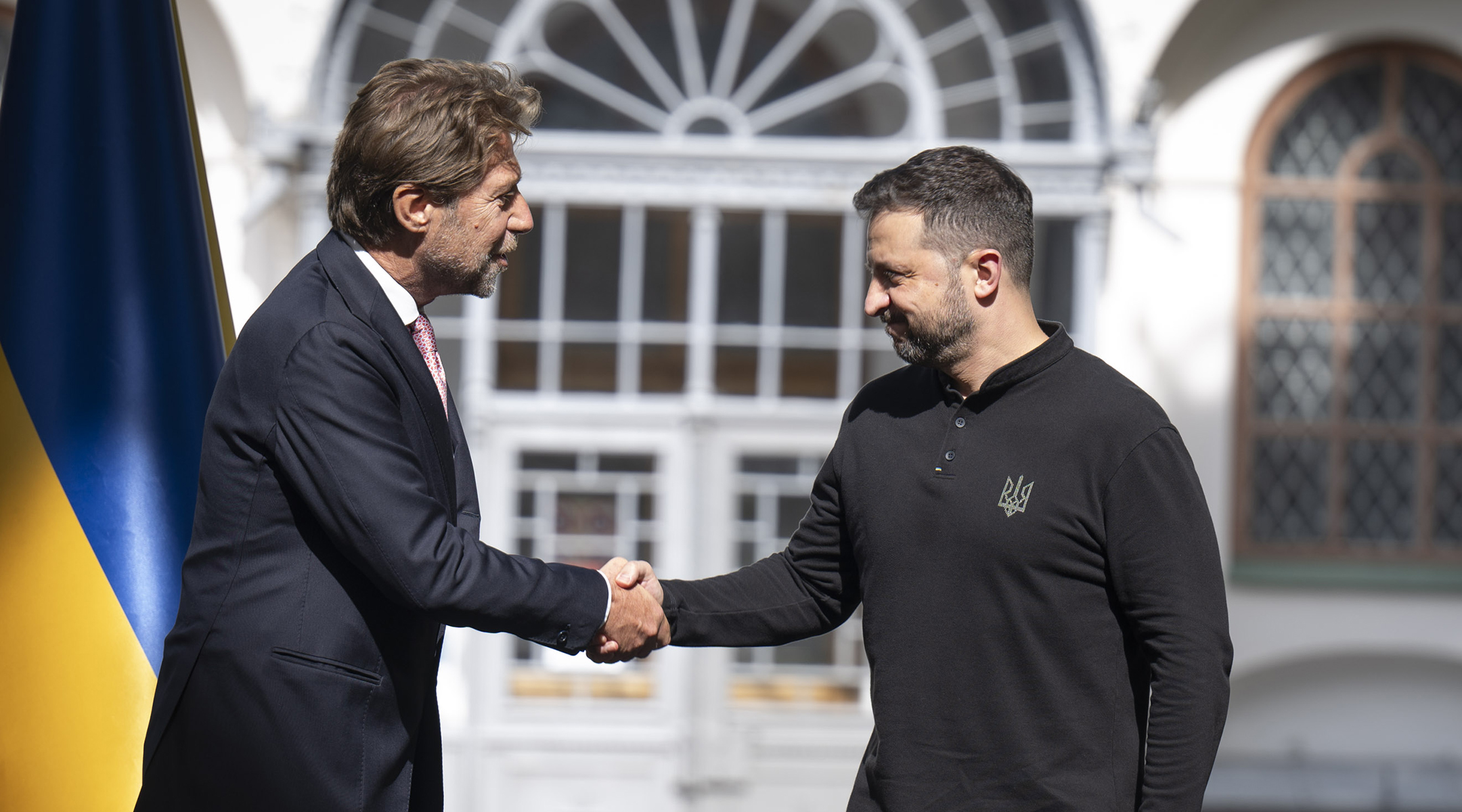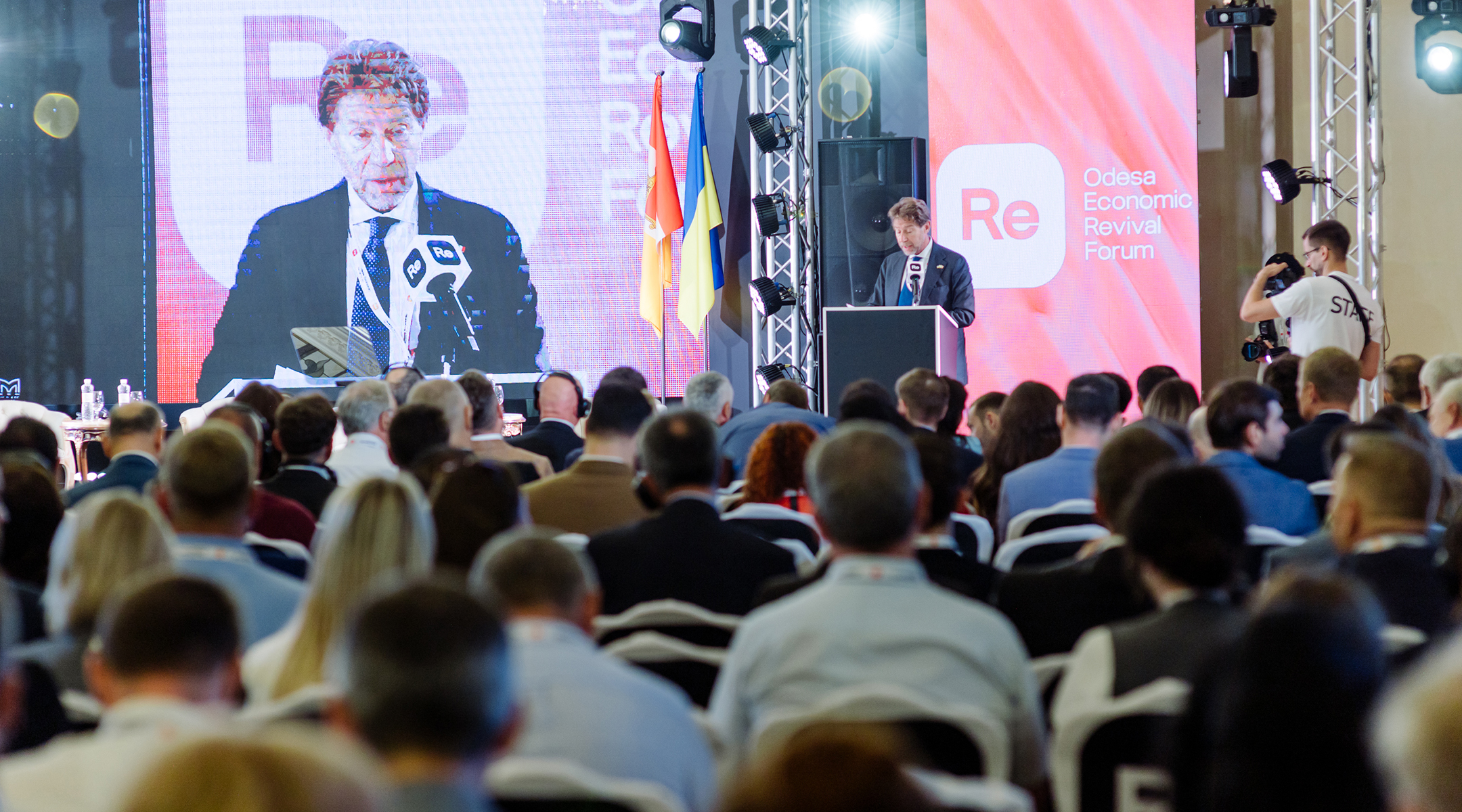The G7 foreign ministers met in Rome last week, dedicating the bulk of their discussions to supporting Ukraine – its issues were highlighted immediately after the introduction in the final statement. The participants condemned the use of an Oreshnik intermediate-range ballistic missile as reckless and escalatory behavior, warned North Korea against aiding Russia, and pledged to begin distributing funds from a $50 billion loan package to Ukraine by the end of the year.
The choice of venue was no coincidence, as Italy holds the G7 presidency in 2024. Ukrinform spoke with the Italian Ambassador to Ukraine, Carlo Formosa, ahead of Italy handing over this role to Canada in 2025. In his first interview with Ukrainian media, Formosa discussed the G7 meeting and Italy's support for Ukraine.
KYIV MUST BE IN STRONG AND SOLID POSITION FOR PEACE TALKS
– During the meeting in Italy, the G7 ministers condemned in the strongest possible terms Russia's nuclear rhetoric, stating that the use of an intermediate-range ballistic missile on November 21 was further evidence of its reckless and escalatory behavior. Do you believe this statement is sufficient given the Kremlin's ongoing escalation?
– Our ultimate goal remains to reach a comprehensive, just and lasting peace, capable of restoring full respect for the fundamental principles of international law, blatantly breached by Russia. To that end, we will continue engaging also with global partners and actors — let me mention China, India, and Brazil - to achieve the widest possible international support for the key principles and objectives of Ukraine’s Peace Formula, in line with international law.
After more than 1000 days of war, the G7 support for Ukraine will remain unwavering, as it is necessary for Kyiv to be in a strong and solid position for any peace talks or negotiations. Yet we are not seeing any sign of openness to a peaceful solution from Russia, the aggressor State.

– President Volodymyr Zelensky, speaking at the European Political Community Summit in Budapest, emphasized the need to stick to the concept of "peace through strength" while warning of the consequences of making concessions to Russia. Do the G7 countries share this position?
– I believe that this overall reflects a concept G7 countries have been defending since the onset of the aggression, which is that our support to Ukraine for as long as it takes is aimed at reaching the conditions for a just and lasting peace, based on the UN Charter and respectful of Ukraine itself. The ultimate goal is to put Ukraine in the condition of being able to decide how to shape any future negotiating process.
G7 FULLY COMMITTED TO SUPPORTING DECENTRILIZATION OF UKRAINE'S ENERGY GRID
– Russia is once again attacking Ukraine's critical infrastructure, trying to cause a humanitarian crisis this winter. What level of support for our power grid can we expect from the G7 countries?
– The Italian G7 Presidency attaches the highest priority to recovery and reconstruction of Ukraine, with a specific focus on its energy sector. Timely protection, repair and reconstruction of its energy grid bear direct relevance for the Ukrainian people’s livelihood, as well as for the resilience of its production system.
As winter approaches, Italy is ready to support Ukraine through concrete steps. Last September in New York, Deputy Prime Minister Antonio Tajani co-chaired, together with US Secretary of State Antony Blinken, the G7+ Ministerial Meeting, to raise awareness and accelerate international support.
Bilaterally, Italy has constantly supported Ukrainian immediate needs, and we are ready to provide more help in the near future, including through b2g and b2b partnerships. Looking at the future, we are proud to continue our support also next year as hosts of the Ukraine Recovery Conference, to be held on July 10-11 in Rome. Overall, we are fully committed to strengthen Ukraine’s energy security, with a vision to help creating a more decentralized, diversified, resilient, and sustainable energy system, which is fully integrated with Europe.
VAST MAJORITY OF ITALY’S PARLIAMENT ENDORSED ALL MEASURES OF SUPPORT FOR UKRAINE
– Democratic countries are facing the rise of populism, and the G7 countries are no exception. Some politicians tend to blame Ukraine for its internal problems and even accuse it of provoking Russian aggression. Do you see this as a challenge to your support for Ukraine? How can you consistently convey to the public who the true aggressor is and who the victim is?
– I believe facts speak louder than words. As of September 2024, Italy has welcomed over 173 thousand Ukrainians — making us the fourth European country in terms of arrivals — showing great solidarity, supporting them and helping them settle into society, with full access to healthcare, education and other basic services on an equal footing with Italian citizens.
One of the dimensions of the upcoming Ukraine Recovery Conference 2025, chaired by Italy, will be human capital and civil society resilience. We are supporting Kyiv with an overall bilateral aid topping 4 billion euros and our contribution to financial aid packages that run into the double digits. The vast majority of parliamentary forces have so far endorsed all measures of support for Ukraine, including allowing a steady flow of defense aid. I can make other examples, but the picture of where Italy stands is clear.
– German Chancellor Olaf Scholz's call to Vladimir Putin, reportedly coordinated closely with the G7 countries, was met with criticism in Ukraine, with some viewing it as a weakening of the Kremlin leader's isolation. Does this mean the G7 countries are changing their strategic approach to Russia, from isolation to seeking dialogue?
Each country and each leader is free to make their own choices, but we feel that any step without previous coordination is doomed to be ineffective. The priority for Italy is to continue to act united to make sure there is a broad peace conference with all sides and relevant actors at the table to find shared, sustainable, just and lasting solutions.

UKRAINE RECOVERY CONFERENCE IN ROME WILL FOCUS ON ENERGY, INFRASTRUCTURE, DEFENSE INDUSTRY, AND AGRI-BUSINESS
– This year, the Italian Embassy in Kyiv has been responsible for coordinating the G7 Ambassadors' Support Group in Ukraine, focusing on supporting the government and people of Ukraine in their domestic reform efforts, with particular emphasis on strengthening the rule of law, tackling corruption, judicial reform, decentralization, promoting democracy, and transitioning to a green economy. What is the balance of activities for 2024?
– Ukraine is now a candidate to the EU, with negotiations for its accession open and ongoing since last June: this is a historic milestone for Ukraine.
The Group I had the honor to lead has been working collectively with all Ukrainian authorities and agencies, as well as partners and financial institutions involved in the implementation of the reform agenda to achieve this goal. We now need to stay the course, including by overcoming resistance to change while focusing on strengthening the rule of law, eradication of corruption and reinforcing transparency and effectiveness of the Ukrainian Administration. The G7 Ambassadors Support Group will continue to play its important part in this process by focusing on critical reforms for Ukraine’s European path, resilience, and reconstruction, to contribute to its aspirations for a prosperous future.
Italy will continue its commitment in this field also through the next year in the framework of the Ukraine Recovery Conference in Rome, which will have a specific focus, among others, on supporting country’s efforts in the alignment with EU’s acquis.
– How will the agenda of the Ukraine Recovery Conference in Rome differ from that of similar conferences held in Lugano, London, and Berlin?
– By hosting the Ukraine Recovery Conference in 2025, Italy intends to foster an inclusive and results-oriented approach. In continuity with the Berlin edition, the agenda will focus on four key dimensions: the involvement of the private sector, the local dimension, the reform process for EU membership and the development of human capital. Preparatory events will be devoted to each of these areas, and the human capital event will take place in Kyiv.
Italy aims to identify concrete deliverables for each area, in close cooperation with Ukraine, which will co-chair the event, and with the support of other international donors. There will be a special focus on crosscutting themes and strategic sectors for reconstruction, such as energy, infrastructure, defense industry, and agri-business.
In addition, the Conference will host a session of the Steering Committee of the Donor Platform, to promote greater integration between the Platform and the Business Advisory Council, thereby strengthening the role of the private sector in the reconstruction of Ukraine. At this regard, following the bilateral Reconstruction Conference of April 2023 and the Business Forum of November 20, we also expect the URC to lead to concrete signature of valuable contracts between companies of our countries, thus enhancing the role the Italian productive system can play to support the prosperous future of Ukraine.
Ivan Kosiakin, Kyiv
